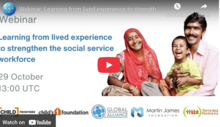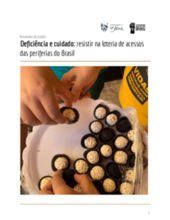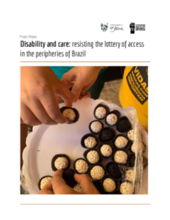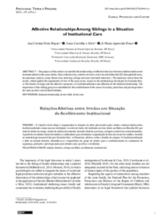Displaying 1 - 10 of 84
This webinar showcased the learning from Strengthening the Social Service Workforce for Family-Based Care, a two-year project implemented by the Global Social Service Workforce Alliance, with technical support from Child Frontiers, under a grant f
This article examines how racial inequality shapes institutional care for adolescents in Brazil and highlights how racial literacy workshops exposed both gaps in practitioners’ understanding and systemic barriers to anti-racist practice. Despite these challenges, the intervention showed promising improvements, underscoring the urgent need to embed racial literacy in public social assistance policies and high-complexity care services to better protect Black adolescents.
Este relatório examina o contexto histórico e social da deficiência e do cuidado no Brasil, com ênfase na percepção das mães e cuidadoras, destacando as desigualdades profundamente enraizadas enfrentadas por pessoas com deficiência e suas mães, particularmente em áreas periféricas. A história de exclusão do Brasil, enraizada em ideologias racistas, capacitistas e sexistas, continua a marginalizar pessoas negras, mulheres e pessoas com deficiências, com mulheres negras e pobres desproporcionalmente atribuídas a papéis de cuidado.
This report examines the historical and social context of disability and care in Brazil, with emphasis on the perception of mothers and caregivers, highlighting the deep-rooted inequalities faced by people with disabilities and their mothers, particularly in peripheral areas. Brazil’s history of exclusion, rooted in racist, ableist, and sexist ideologies, continues to marginalize Black people, women, and people with disabilities, with Black and poor women disproportionately assigned care roles.
Summary
This role will lead on the development and implementation of a new child-safeguarding programme in Brazil, as well as contribute to the development of Keeping Children Safe globally.
You’re invited to the upcoming webinar Including support for informal kinship care in policy on 6 November at 13:00 UTC. In this webinar, panelists will explore and demonstrate how kinship care can be included in policy and supported without formalisation.
This study aimed to analyze the narratives of social educators regarding their practices within a foster care institution for children and adolescents in South Brazil.
This webinar introduced new global inter-agency guidance on kinship care. During the webinar, panelists shared key lessons learnt on how to support kinship care, drawing particularly on examples of promising practices from South Africa, Zimbabwe, Liberia, and Brazil.
The purpose of this article is to identify the relationships of affection that exist between children/adolescents institutionalized in the same shelter. Data collection was carried out with two sisters hosted in Brasília-Distrito Federal.






